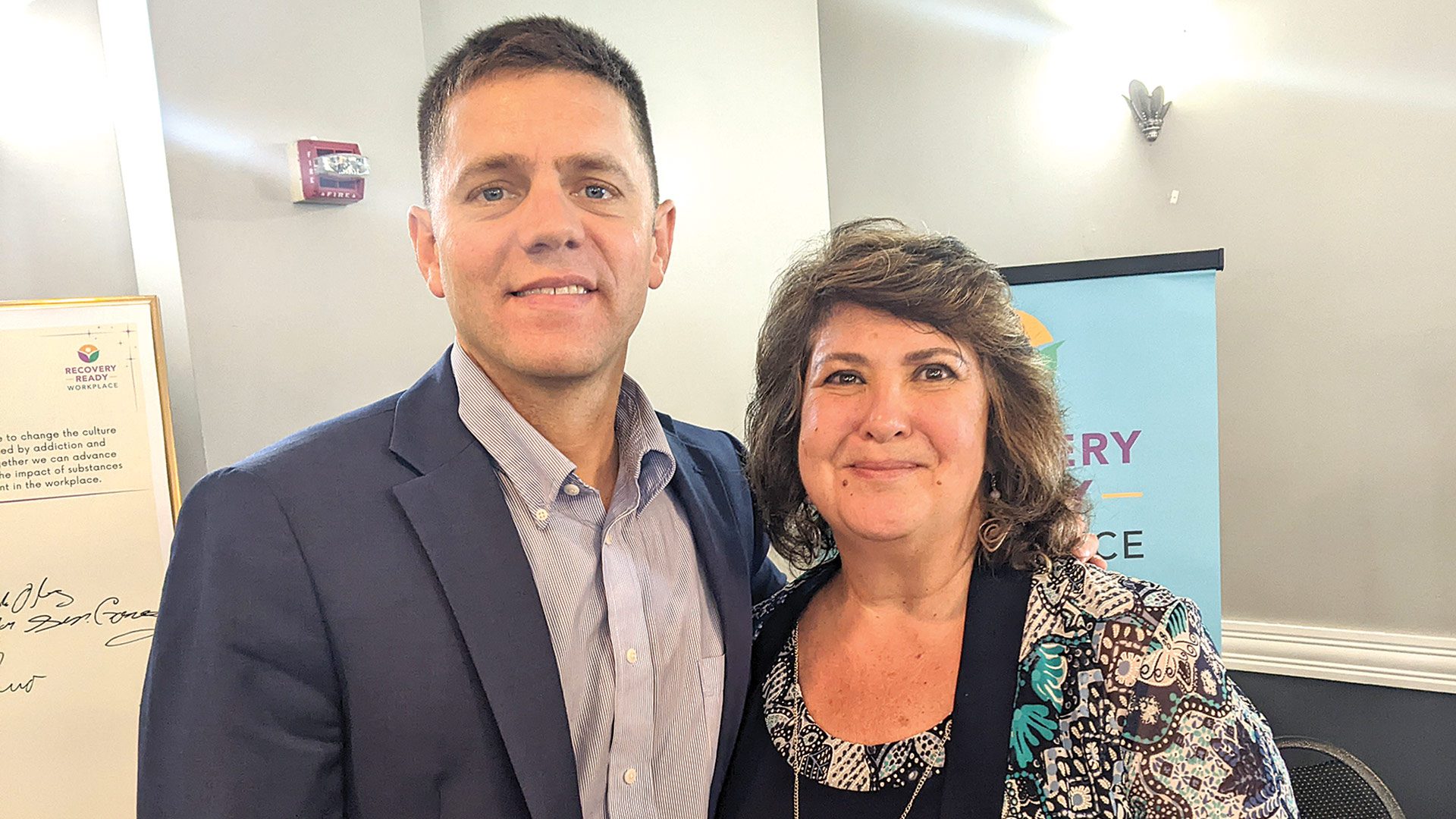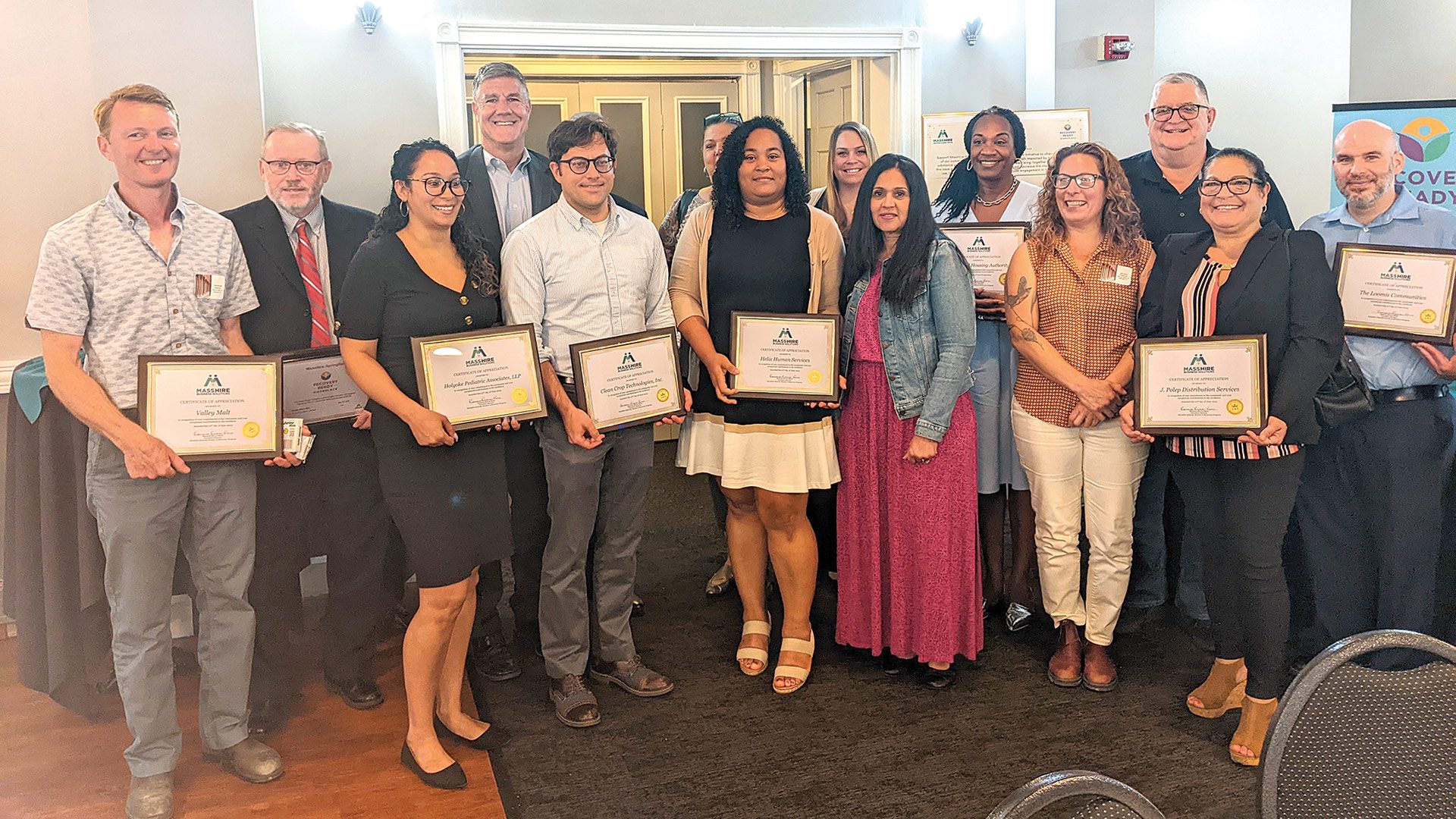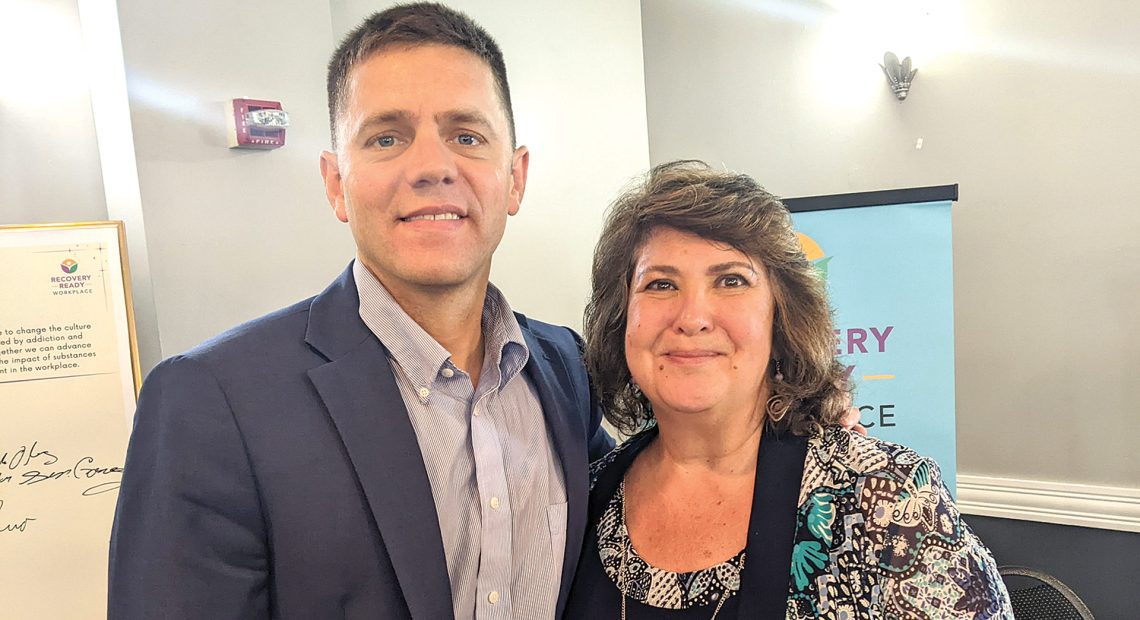‘It’s the Right Thing to Do’

State Sen. John Velis and Ramona Rivera-Reno say being a Recovery Ready Workplace is good for employees — and the bottom line.
State Sen. John Velis knows something about addiction and recovery, having experienced both in his life. And as chair of the state Legislature’s Joint Committee on Mental Health, Substance Use, and Recovery who also serves on a national mental-health task force, he’s keenly aware of the intertwined challenges of recovery and employment.
That’s why he firmly believes the Recovery Ready Workplace initiative offers businesses a roadmap to not only help employees with the biggest challenges of their lives, but to help their business succeed at the same time.
“If you don’t have a healthy workforce, if you don’t have a workforce that is there, in the here and now, to do their job, you’re going to see that in your productivity — more specifically, loss of productivity,” he said.
So helping employees struggling with mental-health issues, addiction, and other challenges is certainly a bottom-line issue, he went on. But, more importantly, it’s a human issue. “It’s important to do it for many reasons, but most importantly, it’s the right thing to do.”
Velis shared these thoughts at a recent employer-appreciation breakfast presented by MassHire Holyoke’s Pillars of the Community Workforce (PCW) initiative, during which several local businesses were honored for their pledge to become a Recovery Ready Workplace — a national program he believes is more crucial than ever.
“What I know with absolute certainty is that the pain that’s being felt out there right now, the number of people dying, the number of people struggling with their mental health, is unprecedented,” he said, adding that this issue “absolutely transcends age, socioeconomic status, race, ethnicity, everything. There is pain out there.”
A Recovery Ready Workplace supports its community by recognizing recovery from substance-use disorder as a strength, according to MassHire. Companies that take the pledge actively work to maintain and support the employment of people in recovery and their loved ones, and creates a healthy and safe environment where employers and employees can work together to eliminate barriers for those impacted by addiction, reduce stigma and judgment of people in recovery, and start to shift attitudes and perceptions around these issues.
“What’s our mission? To create a culture of support for employers and employees that have been impacted by substance use and addiction,” said Ramona Rivera-Reno, executive director of MassHire Holyoke’s Re-entry & Recovery program. “And when I say create a culture, I’m talking about breaking down the stigma that goes with substance-use disorder.”
“What I know with absolute certainty is that the pain that’s being felt out there right now, the number of people dying, the number of people struggling with their mental health, is unprecedented.”
Reducing or eliminating that stigma is a critical step, she emphasized.
“We’re all in recovery from something, whether it’s recovering from surgery, recovering from the pandemic, recovering economically. There’s a lot of pressure on all of us. And we need to have the coping skills and the communication skills to overcome that as a community together. And that’s what the Recovery Ready Workplace is all about — educating employers, helping them educate their staff, adding it as a wellness benefit to their benefits. The more people you educate, the more communication you get out there, the more we’ll break down that barrier.”

MassHire Holyoke recently recognized about a dozen local businesses for taking the Recovery Ready Workplace pledge.
MassHire notes that being a Recovery Ready Workplace does not mean accepting or enabling intoxication, substance use, or any unsafe conditions in the workplace. What it does mean is that the business:
• Acknowledges that addiction is an issue for many people by openly addressing the topic of drug and alcohol misuse, communicating about these issues in a non-judgmental and honest way to reduce stigma, and encouraging employees to discuss substance-use concerns and recovery successes in a non-punitive setting;
• Educates employees and customers about the disease of addiction and treatment resources and options;
• Offers policies and accommodations that support employees while rethinking hiring standards around gaps in employment, addiction-related justice history, and other considerations;
• Prioritizes safety by preventing employee exposure to unsafe conditions that could cause injury or illness that contribute to the development or recurrence of substance-use disorders, ensuring the workplace is an emotionally and socially safe and healthy environment for staff, and improving access to recovery supports; and
• Improves access to recovery supports by lowering barriers to seeking and receiving care for addiction, and maintaining recovery.
Making a Difference
Holyoke Mayor Joshua Garcia said the city itself is taking a pledge to be a Recovery Ready Workplace. He recognized why some companies would be hesitant to sign on, but agreed with Velis that it’s the right thing to do.
“Obviously, as a company, you have to make sure you have your systems in place to help navigate potential liability and harm to your company because that’s the bottom line,” Garcia noted. “But these are the folks that are helping you build that. So, whatever little bit you can do to help build people up, you’re going to see a return from those individuals that really appreciate the level of interest you’ve taken on them, and the risk you’ve taken on them.”
Rivera-Reno said companies and organizations that take the pledge agree to acknowledge and openly address the employees’ experience with drug and alcohol misuse in the process of recovery.
“A lot of people suffer from different things, whether it’s substance-use disorder, alcoholism, mental-health issues, and they don’t ask for help because the stigma attached to it. It’s a sign of weakness for a lot of people.”
“You’re free to educate your employees about the disease of addiction and treatment options in recovery support, and offer support. And there’s so many ways you can offer support.”
It can be as simple as offering a dollop of schedule flexibility. She cited one client who used to go to lunchtime recovery meetings, but could no longer do that at a new job. “So we had someone talk to the employer, and the employer decided, ‘well, you can come in early, and you can have a longer lunch and just stay later.’
“That makes a big difference to someone,” she went on. “Something simple like a flex schedule made all the difference. And that person’s still working today, and he wouldn’t have had the courage, I think, to do this if we didn’t have a recovery coach talking with him along the way, and if the employer wasn’t aware of our services and aware of what a recovery-friendly place is.”
Rivera-Reno called stigma a more deadly killer than cigarettes, heroin, or whatever substance because it keeps people in the shadows and keeps them from asking for help. Companies that pledge to help break that stigma, she said, are changing lives.
“A lot of people suffer from different things, whether it’s substance-use disorder, alcoholism, mental-health issues, and they don’t ask for help because the stigma attached to it. It’s a sign of weakness for a lot of people. It’s a sign of, like, maybe you’re not ready to work here. So by getting us into the different employers’ offices, talking about recovery as a community, we really make a difference in their lives.”
Garcia emphasized that, with the cost of turnover and difficulty retaining talent these days, it makes business sense for employers to support their employees who are struggling with some of these issues, rather than letting them fall through the cracks.
“Sometimes it’s not even the individual that’s suffering from personal addiction; it’s a son or a daughter or a significant other that impacts them and their performance in the workplace,” the mayor said. “So we’re taking a much more proactive approach when dealing with our employees to help them navigate these problems so that we keep our employees and don’t lose them.”
Indeed, MassHire emphasizes the bottom-line benefits of cultivating a Recovery Ready Workplace, including increased retention and fewer absences, a healthier and safer work environment, greater productivity and loyalty among staff, lower healthcare costs, and an enhanced reputation as a supportive, yet accountable organization.
And with 22 million Americans identifying themselves as people in recovery, it’s not something businesses can afford to ignore.
“You already have countless employees who are struggling with something, whether it be a substance-use disorder or something else,” Velis told those attending the breakfast. “You have that without knowing it.”
Breaking the Cycle
Velis ended his address on a personal note, and an encouragement to practice self-care. He said he was late to the event because he was bringing his son to daycare.
“Probably two or three years ago, I would have said to my better half, ‘I gotta go. I gotta be at work. I’m speaking at this event.’ And I don’t do that now because being a dad is the most important thing in my life, but also because I firmly believe when I go to bed at night that self-care is the most important thing every human being does — whether it’s going for a run, doing yoga, meditating, going to a 12-step meeting, or hanging out with my son.”
And that’s what Recovery Ready Workplaces do, proponents say, noting that recovery isn’t just stopping substance use, but taking a journey of growth, improvement, and perseverance. And that’s exactly the kind of employee companies taking the pledge value.
“If you were to look out at your employees and say, ‘raise your hand if you’ve ever struggled with a mental-health issue or a substance-use issue,’ you wouldn’t do that, but trust me when I tell you, many people in that room are struggling with it right now,” Velis said. “And when you welcome that, when you talk about it, when you let it be known that it’s OK, you’re doing a really beautiful thing.”
That’s because the stigma still exists, he added. “The three hardest words for any human being to say are also the most courageous words: ‘I need help.’ Behavioral health today is about meeting people where they are.”






